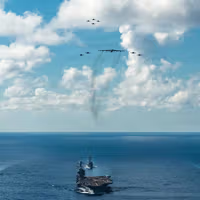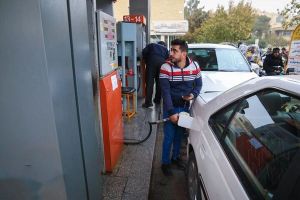Madani, director of the UN University Institute for Water, Environment and Health and former deputy head of Iran’s Department of Environment, told Eye for Iran that the country is not going through a normal drought but what he calls water bankruptcy.
This is a condition in which consumption exceeds supply and the reserves built over generations have already been drained.
“We have never seen such a thing,” Madani said. “The people of Tehran, the city that is the richest, most populous and strongest politically, is running out of water, is facing day zero.”
Satellite images and field data show alarming patterns nationwide. Tehran’s five main reservoirs are at some of their lowest recorded levels. Mashhad’s major dams have fallen below 3 percent capacity.
In many regions groundwater has sunk so deep that recovery is unlikely in this generation. The Ministry of Energy has already prepared rationing plans. Some neighborhoods have reported nighttime cuts. Officials have urged households to purchase storage tanks.
But experts stress that households are only a small part of the equation. More than 70 percent of Iran’s 90 million people live in large cities with no mid-size urban centers to absorb population shifts.
Ninety percent of all water use still goes to agriculture, a sector governments have protected for decades under a policy of food self-sufficiency. That choice has prevented water from being redirected toward cities even as the climate has grown hotter and drier.
For decades the state masked scarcity by expanding supply: building dams, drilling deeper wells and pumping water across basins from distant aquifers.
These measures created the illusion that dry regions, including the Tehran plain, could continue to grow. Over time that perception encouraged development and migration beyond what the land could sustain.
Aquifers drained, river exhaustion
With reserves depleted, Iran’s cities have very little left to fall back on.
Madani warns that if winter rains fail life in major cities could shift abruptly. “It means pumps and stores, delivery through tankers, more bottled water instead of tap water, a change of lifestyle.”
At the same time he cautions against mistaking brief rainfall or even seasonal floods for real recovery.
One storm could momentarily refill canals or ease pressure on local networks. But the underlying deficits, from drained aquifers to collapsing river systems, remain unchanged. “These days are real,” Madani said. “And even if in a few months there are floods, we shouldn’t conclude the problem has been resolved forever.”
Years of sanctions and a so-called resistance economy have pushed the state to extract whatever natural resources remain. Environmental reform is costly and slow with benefits that may not appear for a decade.
Asking citizens to cut consumption requires public trust, something the government lacks. Without transparent information about what reserves remain and clear communication about the severity of the crisis, cooperation will remain limited.
There is still a narrow window, Madani says. A few hours of concentrated rainfall could buy cities days. Collective reductions in consumption could buy weeks. But the structural imbalance, too many people and too little water, is now a national reality.
“This is a national security issue,” he said. “It affects every Iranian, no matter who is in charge.”
You can watch the full episode of Eye for Iran on YouTube or listen on any podcast platform of your choosing.











